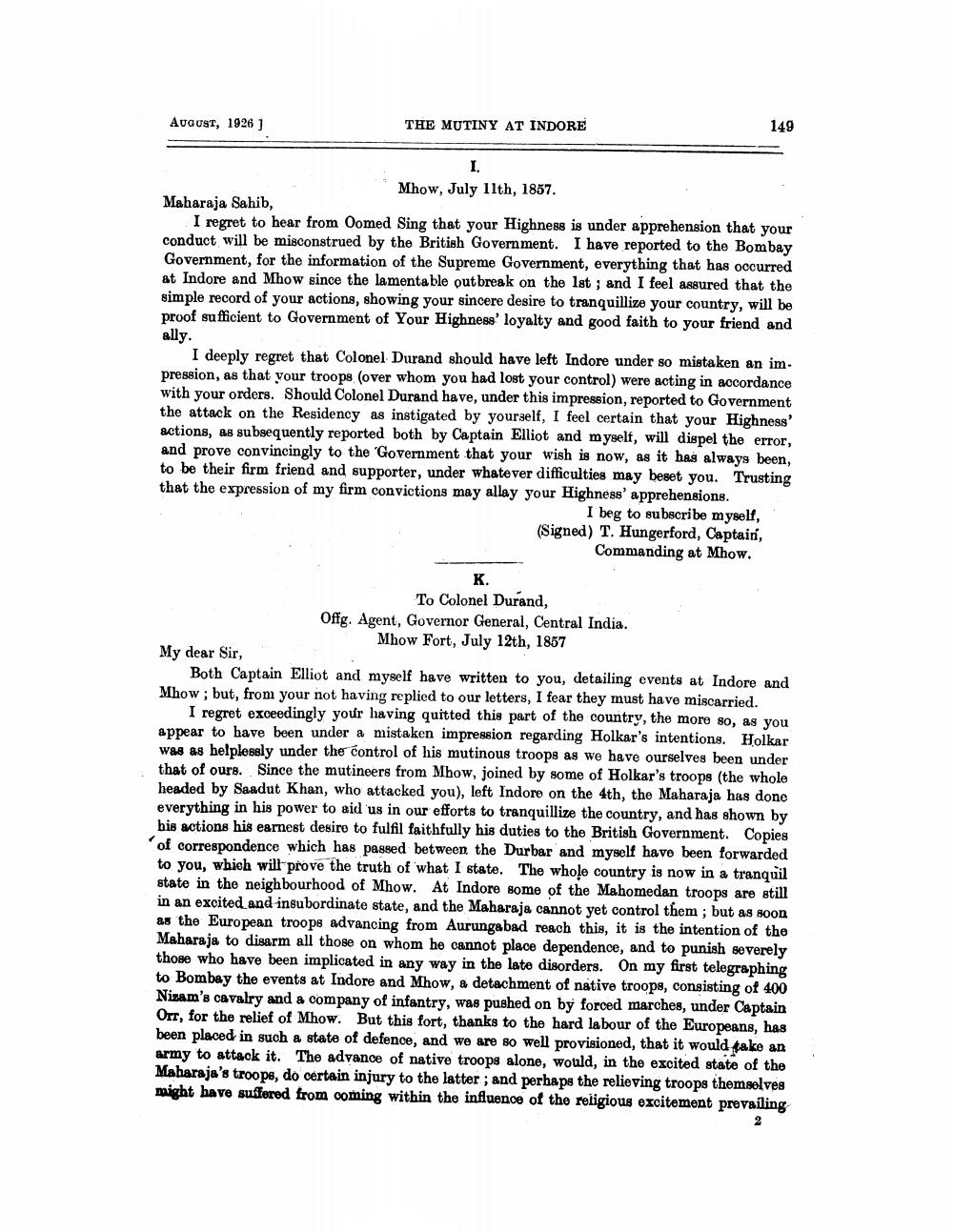________________
AUGUST, 1926 ]
THE MUTINY AT INDORE
I.
Mhow, July 11th, 1857.
Maharaja Sahib,
I regret to hear from Oomed Sing that your Highness is under apprehension that your conduct will be misconstrued by the British Government. I have reported to the Bombay Government, for the information of the Supreme Government, everything that has occurred at Indore and Mhow since the lamentable outbreak on the 1st ; and I feel assured that the simple record of your actions, showing your sincere desire to tranquillize your country, will be proof sufficient to Government of Your Highness' loyalty and good faith to your friend and ally.
149
I deeply regret that Colonel Durand should have left Indore under so mistaken an impression, as that your troops (over whom you had lost your control) were acting in accordance with your orders. Should Colonel Durand have, under this impression, reported to Government the attack on the Residency as instigated by yourself, I feel certain that your Highness' actions, as subsequently reported both by Captain Elliot and myself, will dispel the error, and prove convincingly to the 'Government that your wish is now, as it has always been, to be their firm friend and supporter, under whatever difficulties may beset you. Trusting that the expression of my firm convictions may allay your Highness' apprehensions.
I beg to subscribe myself, (Signed) T. Hungerford, Captain, Commanding at Mhow.
K.
To Colonel Durand,
Offg. Agent, Governor General, Central India. Mhow Fort, July 12th, 1857
My dear Sir,
Both Captain Elliot and myself have written to you, detailing events at Indore and Mhow; but, from your not having replied to our letters, I fear they must have miscarried.
I regret exceedingly your having quitted this part of the country, the more so, as you appear to have been under a mistaken impression regarding Holkar's intentions. Holkar was as helplessly under the control of his mutinous troops as we have ourselves been under that of ours. Since the mutineers from Mhow, joined by some of Holkar's troops (the whole headed by Saadut Khan, who attacked you), left Indore on the 4th, the Maharaja has done everything in his power to aid us in our efforts to tranquillize the country, and has shown by his actions his earnest desire to fulfil faithfully his duties to the British Government. Copies "of correspondence which has passed between the Durbar and myself have been forwarded to you, which will prove the truth of what I state. The whole country is now in a tranquil state in the neighbourhood of Mhow. At Indore some of the Mahomedan troops are still in an excited and insubordinate state, and the Maharaja cannot yet control them; but as soon as the European troops advancing from Aurungabad reach this, it is the intention of the Maharaja to disarm all those on whom he cannot place dependence, and to punish severely those who have been implicated in any way in the late disorders. On my first telegraphing to Bombay the events at Indore and Mhow, a detachment of native troops, consisting of 400 Nizam's cavalry and a company of infantry, was pushed on by forced marches, under Captain Orr, for the relief of Mhow. But this fort, thanks to the hard labour of the Europeans, has been placed in such a state of defence, and we are so well provisioned, that it would take an army to attack it. The advance of native troops alone, would, in the excited state of the Maharaja's troops, do certain injury to the latter; and perhaps the relieving troops themselves might have suffered from coming within the influence of the religious excitement prevailing
2




